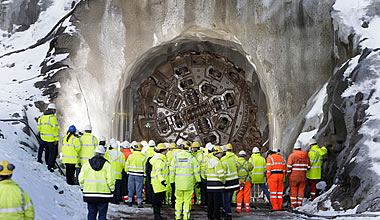 The tunnel at Glendoe |
The UK's Health & Safety Executive (HSE) has suspended use of all vehicle and plant equipment at a Scottish worksite after two workplace incidents.
Hochtief UK, the main contractor on Scotland's GBP140 million (USD224 million) Glendoe hydroelectric project, was ordered to suspend use of all plant and construction vehicles following an incident that left a man with a broken leg.
The worker was injured when the roller he was driving overturned. An investigation revealed the seat belt was defective.
HSE served the company with a prohibition notice banning it from using all vehicles and rider-operated plant until they have been certified as safe.
It was the second incident on the site. A man died last month in a "suspected telehandler" incident.
Richard Shore, managing director of Mentor Training, says proper training of workers and employers can prevent incidents like these. "In the UK, we have well-established guidance, which was introduced in 1988, from our HSE for training operators.
"Companies should follow the recommendations of this guidance and use accredited training providers who are properly monitored to ensure high and consistent standards of training."
Shore says while telehandlers are a more recent innovation than traditional forklifts, their versatility has made them popular, particularly in the construction industry. "Companies looking to train operators on telehandlers should ensure the training company they select has a recognised, accredited course for this type of machine as they are more susceptible to tipping over if used improperly."
Telehandler equipment training generally takes a maximum of five days and is readily available. Shore says there is a wide choice of training organisations, from one-man bands to larger companies offering a nationwide service. "In 99% of cases, the instructor will travel to the customer's site so delegates are trained in the environment they will work in and on the equipment they will be using."
Shore told
Forkliftaction.com News that a survey by the British Safety Council found British businesses are losing GBP250 (USD401) a second in costs and payouts for needless workplace incidents.
"The annual bill for employers is GBP7.8 billion (USD12.5 billion) and, for the economy as a whole, GBP31.8 billion (USD50.9 billion) in payouts and costs," Shore says. "Most companies issuing tenders for work are focusing on a supplier's health and safety record as a vital element of the selection process.
"Having accidents will have a significant impact on a supplier's ability to gain new and additional business."